Love this stuff!
Smells great and makes my skin look amazing.
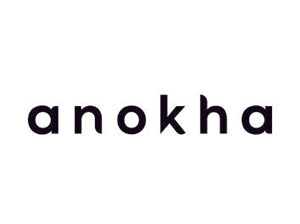
cart
your cart is empty

bakuchiol & pomegranate facial oil
meet the natural retinol alternative
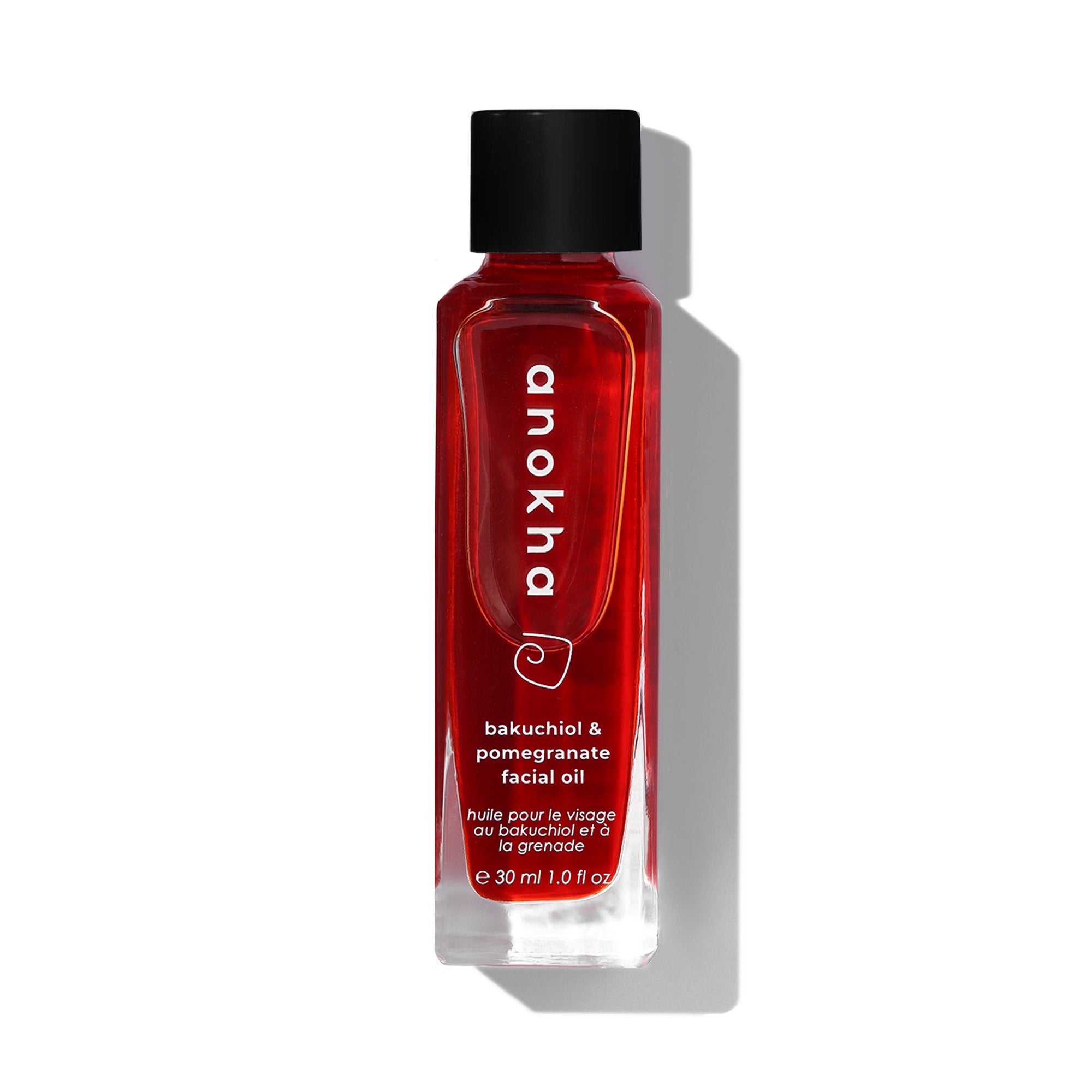


a luxurious, award-winning facial oil that winds back wrinkles, with natural retinol alternative bakuchiol. all the benefits of retinol, none of the red, flaky, side effects.
it’s skin’s very own time machine. fluorescent spandex not included.
beauty has a conscience: 5% of each sale is donated to a humanitarian charity.
98% natural, vegan, cruelty-free, physician-formulated; beautiful.
-> helps reduce the appearance of fine lines, hyperpigmentation and acne.
-> gently assists in brightening and evening skin tone.
-> ideal for dry and irritated skin.
-> boasts an impressive resume.
retinol alternative bakuchiol imparts the benefits of retinol without the significant side effects. this botanical beauty is the secret for naturally clearer, smoother skin.
contains essential fatty acids and vitamin e to improve skin metabolism, soothe irritation, and slow down maturation.
helps maintain skin’s elasticity, reduces the appearance of fine lines and wrinkles, and helps reverse damage from photo-aging. hello bright, bouncy skin.
bisabolol.
anti-inflammatory to accelerate the healing process of skin. also helps with the absorption of other active ingredients, making it bakuchiol’s biggest fan (second to us).
an antioxidant that helps maintain skin integrity, while stimulating the production of collagen and elastin.
Cucumus sativus (cucumber) oil, Punica granatum (pomegranate) seed oil, Vaccinium macrocarpon (cranberry) seed oil, Hippophae rhamnoides (sea buckthorn) seed oil, Rosa mosqueta (rose) hip seed oil, Aleurites moluccana (kukui) nut oil, Alkanna tinctoria (alkanet) root, C12-15 alkyl benzoate, bakuchiol, alpha-bisabolol, tocopheryl acetate, coenzyme Q10, Rosmarinus officinalis (rosemary) extract*
*organic
for more about each of our ingredients, please visit our ingredients directory.
after cleansing and toning, apply 3-4 drops of oil to skin. massage until fully absorbed. can also be applied with a gua sha tool. use twice daily, with results seen in 4-6 weeks, and continued enhancement up to 12 weeks.
made by hand in small batches, please use within six months of opening. suitable for all skin types, and for external use only, beauty.
want a radiant beauty regime? here, take ours
what is bakuchiol?
bakuchiol is an extract that was first isolated in 1966 from the babchi seed obtained from the plant Psoralea corylifolia, a plant used in traditional Ayurvedic and Chinese medicine. Psoralea corylifolia is found in South Asian countries including Pakistan and India.
does bakuchiol show the same results as retinol?
yes. although bakuchiol does not resemble retinoids from a structural level, there is marked similarity between the ingredients in terms of their effects on anti-aging genes and proteins. a study in 2019 evaluated the effects of bakuchiol vs retinol in a double-blinded, prospective study. both ingredients significantly reduced fine wrinkles by the 12-week time point, without differences between the two ingredients. pigmentation was also assessed and at 12 weeks, 59% of the bakuchiol group noted improvement in their hyperpigmentation, while 44% of the retinol group had improvements. bakuchiol is considered by some to be a natural retinol.
will my skin get irritated like it does with retinol?
no, and this is the beauty of bakuchiol. the use of retinols is limited by their high incidence of side effects including irritation, dryness, peeling, redness, and burning – which makes them off-limits for those with sensitive skin. our bakuchiol & pomegranate facial oil can be used twice daily without increasing sensitivity to sun, as occurs with retinol. you may notice some temporary and very mild purging, tightness, dryness, and light flaking of the skin after 2-3 weeks of use.
how long does it take to see results with bakuchiol?
results will be seen in as little as 4 weeks. however, studies have shown cumulative improvement when it is used for 12 weeks, twice daily.
what concentration of bakuchiol is used in anokha's bakuchiol & pomegranate facial oil?
bakuchiol is a concentrated extract with a recommended usage rate of 0.5-1%. we've used bakuchiol at a full rate of 1% in our bakuchiol & pomegranate facial oil.
what makes the oil red?
we've used a proprietary infusion technique which renders this oil its distinctive merlot color - which means that it's a brand secret and we can't tell you how we did it. however, the color comes from a natural source and is not synthetic. and don't worry - it won't stain your face or fingers, but maybe keep it away from that white washcloth.
does bakuchiol help to fight acne?
a pilot study in the treatment of acne patients with 1% bakuchiol, 2% salicylic acid, or 1% bakuchiol with 2% salicylic acid showed a 70% decrease in acne lesions and inflammation in the bakuchiol-salicylic acid group after six weeks of twice daily use. bakuchiol-only patients had a reduction of 57%, followed by salicylic acid patients who experienced a 48% decrease. so - yes, bakuchiol helps to fight acne, especially when used in conjunction with salicylic acid.
how does bakuchiol help with hyperpigmentation?
bakuchiol decreases pigment by means of its antioxidant effects as well as its ability to disrupt melanin synthesis by blocking both alpha-melanocyte stimulating hormone activation and tyrosinase, which is the rate-limiting step in melanin synthesis.
why isn't there a scent added to this oil?
although we love using essential oils in our products, we've kept them out of this oil because it is truly a treatment oil meant to be used as the last step in your routine. layer on our jasmine serum or lotus & lychee facial crème for an uplifting fragrance prior to using this oil.
*the Food and Drug Administration (FDA) has not evaluated the statements on this website. no claims are made as to the medicinal value of any products from anokha. the information presented here is for educating our customers and is not intended to diagnose, treat, cure, or prevent any disease. if you have any questions, please email us for further information: hello@anokhaskincare.com
shipping:
we attempt to ship all orders within 1 business day. you will be emailed a tracking number once your order has shipped. once your order has shipped, we are unable to process a cancellation.
international shipping:
international shipping is available through DHL Global Express or FedEx, which allows you to track the package from our facility to your door. please note that you may have to pay customs charges prior to delivery. shipping and customs charges are not refundable.
although our products are registered within Canada, the United Kingdom and European Union, we are unable to ship to Indonesia, Mexico, Peru, Spain, Turkey, and certain other countries which restrict the import of cosmetics.
return policy:
we strive to ensure your satisfaction, but if for any reason you wish to return a product, please contact us by email at hello@anokhaskincare.com within 30 days of purchase. products must be less than 20% consumed. we will provide you with a shipping label for return of the item. please include the packing slip and the reason for return. we regret that we are unable to refund shipping charges or customs fees. the cost of return shipping will be deducted from your refund.

choose options



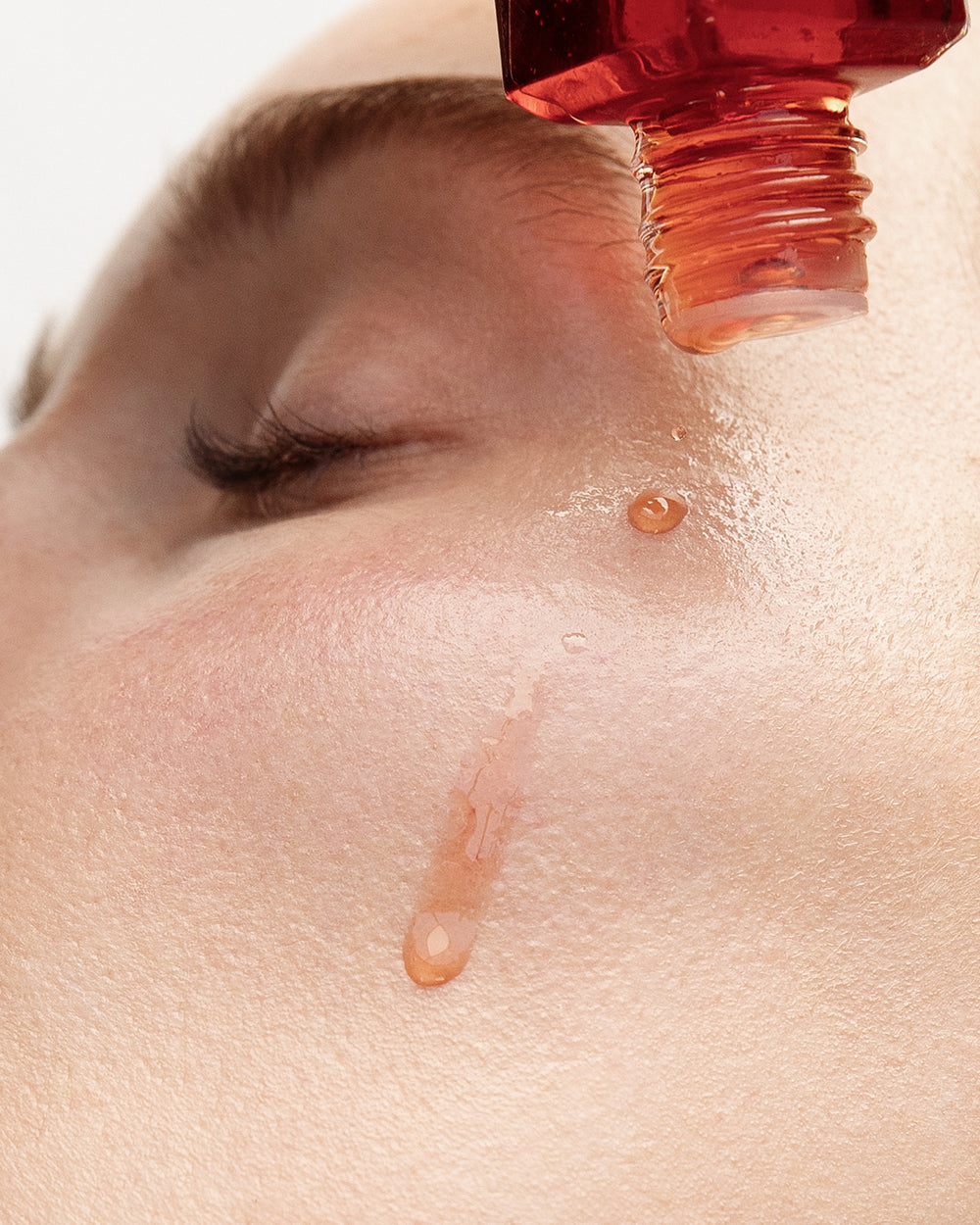
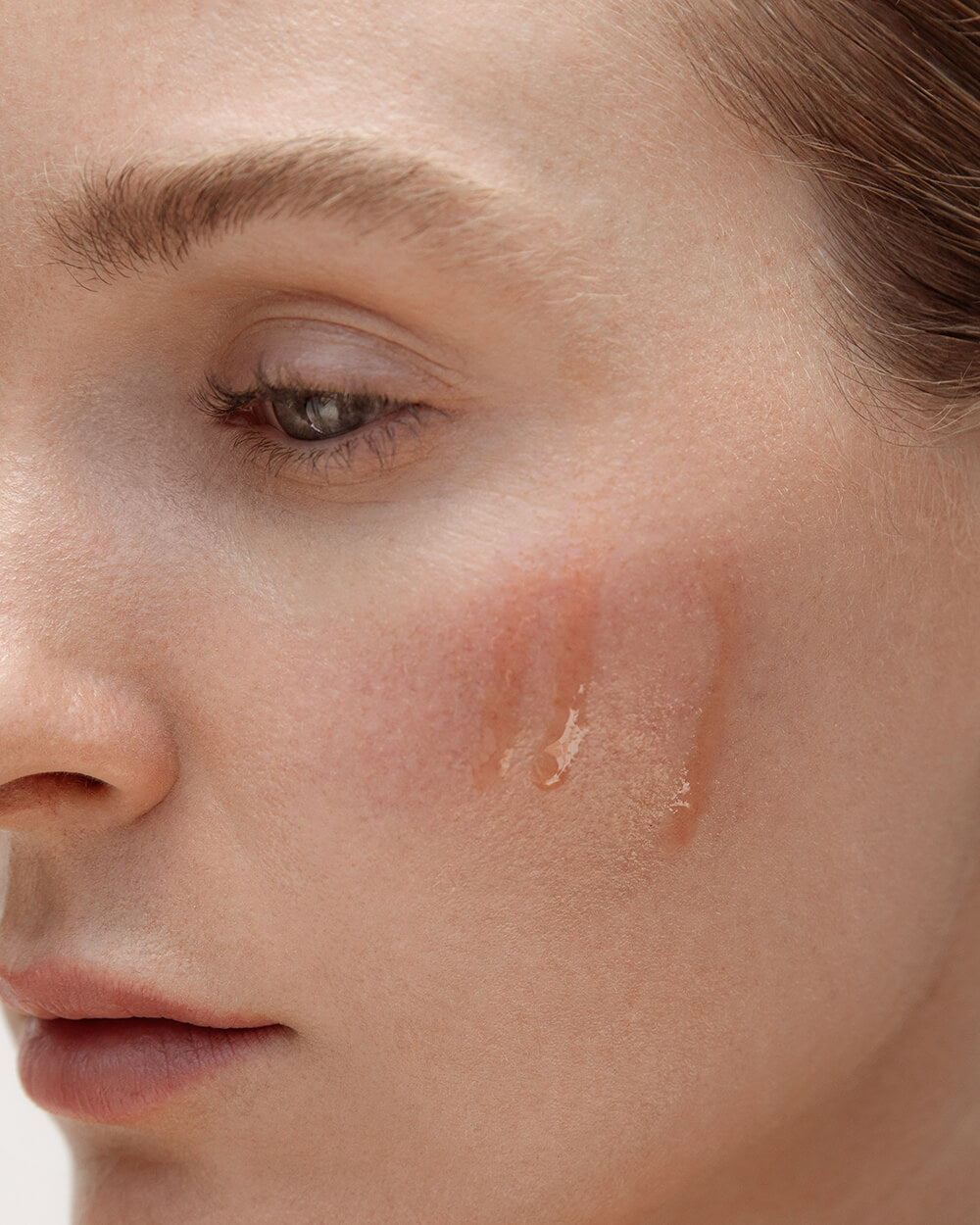
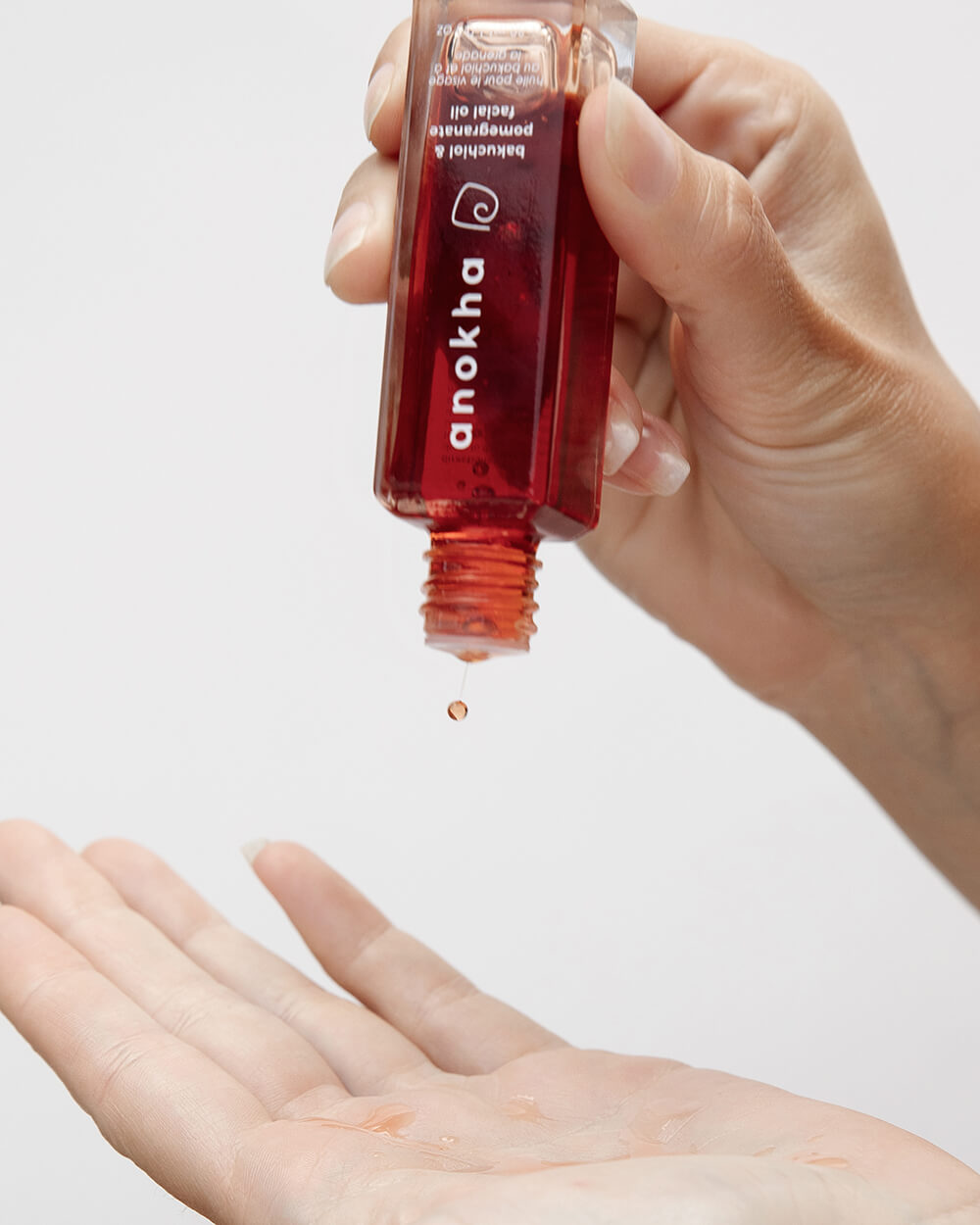
Smells great and makes my skin look amazing.
I bought this product because I wanted to try something clean and non-toxic for my skin as the tone and color (some age spots) desperately needed to be evened out. After three weeks I noticed that my texture had significantly improved and the spots had faded. I had been thinking about getting clear and brilliant done, but definitely did not need it after using this oil. The oil is a little thick, but it absorbs right into the skin. I put a few dabs on before an evening makeup look because the red pigment literally makes my skin glow! A little bit goes a long way and I'm still on my bottle after 3 months, but will definitely be buying more.
thank you, beauty. we adore your skin as much as you do.
xx
anokha
I've been using Anokha's bakuchiol & pomegranate facial oil for weeks now, and I can't recommend it enough. The fact that it's made from natural and organic ingredients really stands out, as it leaves my skin feeling soft, smooth and perfectly hydrated. I also love its delicate and subtle fragrance, and the packaging is elegant and sophisticated. I look forward to applying it everyday!
thank you, beauty. we're delighted to hear you're enjoying this deeply nourishing blend of natural oils and bakuchiol. it's truly a labor of love crafting each blend to deliver radiant, glowing results. we adore your skin as much as you do.
xx
anokha
The lovely fragrance and silky texture of this oil feels like luxury as it rejuvenates my face. After just two weeks I could see a new clarity and healthy glow in my skin . I look forward to using it each day- it locks in moisture and keeps my skin healthy .
I have only used it sparingly. But I love it. It does feel light and tight!
hi beauty, thank you so much for your kind review. xx anokha